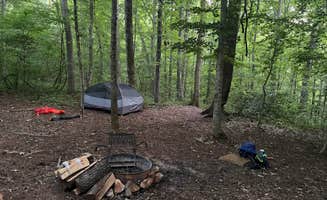Dispersed camping options near Oak Ridge, North Carolina offer primitive outdoor experiences in the Piedmont region. The area sits at elevations between 700-1,000 feet with mixed hardwood forests and access to several watershed areas. Winter temperatures can drop below freezing, while summer camping often requires preparation for humidity and temperatures above 85°F.
What to do
Hiking trails exploration: Birkhead Mountain Wilderness Area features multiple interconnected trails with varying difficulty levels. The trails traverse rolling terrain with elevation changes of 200-300 feet. A visitor noted, "Very nice trails. Well maintained. Not marked the best... signs at intersections."
River activities: Shallow Ford Natural Area provides access to the Haw River for kayaking, canoeing and fishing. The river section features Class I-II rapids depending on water levels. Campsites are positioned within hearing distance of the water, creating a natural soundtrack for overnight stays.
Wildlife observation: The forests near Oak Ridge support diverse wildlife including white-tailed deer, wild turkey, and numerous bird species. Morning and evening hours provide the best viewing opportunities. Bring binoculars for spotting activity in the tree canopy.
What campers like
Natural soundscapes: The ambient sounds of flowing water and forest wildlife enhance the rustic camping experience. One camper at Shallow Ford Natural Area shared, "I would highly recommend this place," noting the peaceful environment with birds and squirrels.
Trail accessibility: Robbins Branch Trail offers multiple entry points for both day hikers and overnight campers. The trail system provides both shorter loops and connections to longer routes, accommodating different experience levels and time constraints.
Secluded campsites: Most dispersed camping areas near Oak Ridge maintain adequate spacing between sites, enhancing privacy. During weekdays, campers often report having entire sections to themselves, particularly in early spring and late fall.
What you should know
Water availability: Prepare to carry all drinking water when camping near Oak Ridge. Birkhead Mountain Wilderness Area has creeks but requires filtration or treatment. One reviewer mentioned, "Plenty of creeks," but these should not be consumed without proper purification.
Vehicle requirements: Forest roads leading to dispersed camping areas often require high-clearance vehicles. Some access points become impassable after heavy rainfall, especially in winter and early spring.
Cell service limitations: Most rustic camping locations near Oak Ridge have spotty or no cellular coverage. Download maps and information before arrival and inform someone of your planned location and return date.
Tips for camping with families
Beginner-friendly options: For families new to dispersed camping, Shallow Ford Natural Area provides a good introduction with its accessible location and relatively flat terrain for tent setup. Children can safely explore the immediate campsite area while remaining within sight of parents.
Water crossing safety: When hiking with children in Birkhead Mountain Wilderness, prepare for multiple creek crossings that may require assistance for younger hikers, especially after rainfall when water levels rise.
Educational opportunities: The Oak Ridge area offers natural science learning experiences through tree identification, animal track spotting, and night sky observation. Bring field guides specific to North Carolina flora and fauna to enhance the educational value for children.
Tips from RVers
Access limitations: Most dispersed camping areas near Oak Ridge accommodate only smaller recreational vehicles or truck campers. Robbins Branch Trail allows RVs but requires careful navigation of narrow forest roads with potential low-hanging branches.
Leveling challenges: Bring extra leveling blocks when boondocking near Oak Ridge as most natural camping spots feature uneven terrain. The standard 14-day camping limit applies to all dispersed camping in national forest areas surrounding Oak Ridge.
Seasonal considerations: Spring and fall provide the most comfortable temperatures for RV camping without hookups. Summer heat often necessitates generator use for air conditioning, but confirm generator policies before arrival as regulations vary by location.


